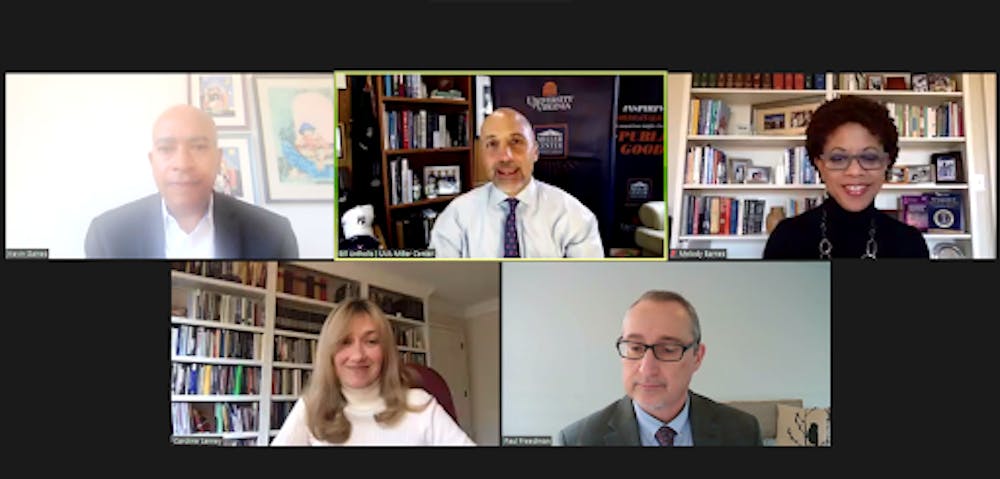The Miller Center organized a panel of speakers Thursday afternoon in an hour-long webinar analyzing recent developments in the aftermath of the presidential election. As of Friday afternoon, former Vice President Joe Biden has 253 confirmed electoral votes, while President Donald Trump has 214. Votes are still being counted in several swing states, including Georgia, Nevada, North Carolina, Pennsylvania and Arizona. Alaska has also not completed counting, though it has historically voted Republican. As of Friday morning, Biden is ahead in Nevada, Arizona, Georgia and Pennsylvania.
The discourse focused on the theme of “Election 2020 Aftermath: Turbulence, transition or tranquility?”
This was the second daily webinar organized by the Center, a product of the combined efforts of the Miller Center, the Democracy Initiative and the new Institute of Democracy to provide expert guidance on deconstructing the post-election climate.
Miller Center Director William Antholis and Democracy Initiative Co-Director Melody Barnes hosted three scholars of varying disciplines in American history and politics.
Paul Freedman, associate professor of Politics and Associate Department Chair, began the discussion by providing contemporary context for the 2020 election. Waiting for results after Election Day is not unprecedented, he stressed. Freedman, who appeared on ABC News on election night, did point out the rareness of being unable to project outcomes for nine states on election night.
“Joe Biden has some more options, more paths to 270 electoral votes ... at this point, but it is not a sure thing,” Freedman said.
Another unprecedented characteristic of the election, Freedman added, was the extremely high turnout, which is currently projected to count over two-thirds of the eligible voting population. According to The New York Times, 60.1 percent of the voting eligible population voted in the 2016 presidential election.
Caroline Janney, director of the John L. Nau III Center for Civil War History, placed the election against a broader historical background. She first noted that in 19th century America, waiting several months for election results was normal. Previous elections of similar high contention were compared to this year’s, including the 1876 election that ended Reconstruction and the 1860 election of Abraham Lincoln that led to the secession of Southern states. Janney characterized the secession as “the simple refusal by a significant portion of the country not to see that vote as legitimate.”
A brief poll was then conducted among webinar participants asking whether participants were surprised by Trump’s gains among Black men, Latinx voters and white men. Around 100 participants answered, 84 percent of which answered yes.
Kevin Gaines, Julian Bond Professor of Civil Rights and Social Justice in the Woodson Institute, discussed statistics on voter demographics. Gaines quoted polls saying 72 percent of voters who looked for characteristics of a “strong leader” in a candidate voted for Trump. He also discussed the relatively high turnout of Black voters for Trump — 18 percent of Black men and 8 percent of Black women. Gaines attributed this outcome to Trump’s collaboration with noted Black hip-hop artists and noted issues with Black Lives Matter leadership, citing possible trends of misogyny and homophobia directed towards minority leaders. He also hypothesized that Black male voters could have related to Trump with his association with “power and impunity.”
“I’d like to call our attention to diversity within homogeneity, within groups,” Freedman said on unexpected voting patterns.
On the topic of issue-based voting, another poll was conducted asking audience members to choose which issues mattered most when they voted — the economy, social justice, COVID-19, health care, crime or other. 59 percent of the approximately 100 voters chose COVID-19. Social justice was a close second at 51 percent, followed by health care with 30 percent, other issues with 24 percent, the economy with 23 percent and crime with 5 percent of the vote.
Democratic vice presidential candidate Kamala Harris, the first woman of color on a major party presidential ballot, briefly took the center of the conversation. Gaines mentioned the increase in support from Black women, but caveated that with ambivalence towards Harris from younger Black voters — most likely due to Harris’s previous stance on incarceration as a former federal prosecutor.
Antholis then conducted a lightning round with panelists, asking each of them for key takeaways on the state of democracy based on the election. Janney described a “sobering feeling” as she recalled that previous elections with notably high voter turnouts have occurred in times of greatest division in the country. Biden, with over 72 million votes and counting, has broken the record for most votes for a presidential candidate in the history of the United States. The rest of the panelists took on a similar grim tone.
“Voting rights have become partisan,” Gaines said.
Gaines further characterized the Trump campaign’s lawsuits against vote counting in Pennsylvania, Michigan and Georgia as “a lot of throwing spaghetti and seeing what sticks.”
“I don’t think all of these legal challenges to the counting of votes in several swing states has any merit,” Gaines said. “I don’t think the charge of voter fraud has any merit.”
Panelists also discussed the future of voting. Freedman predicted that voting early in person and voting by mail be adopted for later elections as well. Virginia implemented its early voting system for the first time this year, which was heavily championed by local officials.
Finally, panelists were asked if they believed this election was a referendum on Trump. Gaines, Freedman and Janney all agreed. Freedman elaborated by adding that Democratic voters were more enthusiastic about voting against Trump rather than for Biden.
Registration is available on the Miller Center’s website for Friday’s panel at 3:30 p.m. Monday’s panel lineup will focus on the topic of litigation with members of the Karsh Center for Law and Democracy.







